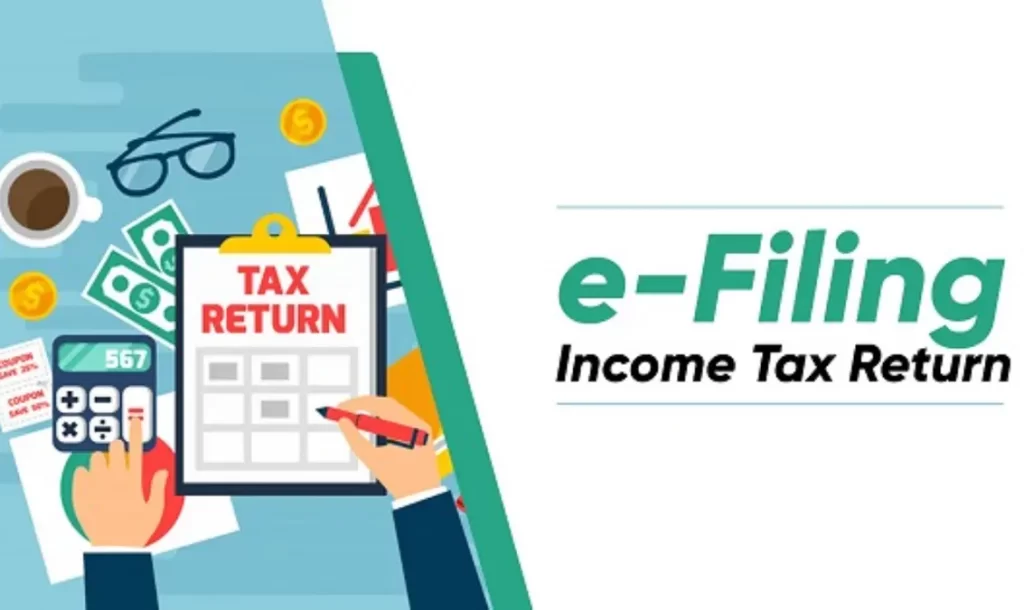An income tax return is a communication made to the Income Tax Department by the taxpayer, informing the department about the financial details of the taxpayer. The details are provided for every financial year and include figures such as the taxable income and tax liability of the taxpayer. Depending on the category of the assessee, different forms are used to file the income tax returns.

What is Income Tax ?
Income tax is a tax you pay to the government based on the income you earn. It is calculated based on income brackets set by the government and helps support public services and development.
The government utilizes the generated revenue to fund essential sectors such as agriculture, education, and healthcare. Online platforms facilitate easy payment of income tax, TDS/TCS, and non-TDS/TCS payments, streamlining the process for taxpayers.
What is e-filing Income Tax return?
According to Section 139 (1) of Income Tax Act 1961, any individuals whose total income in the last year exceeds the tax exemption bracket should file their ITR or income tax returns. E-filing is the process through which an individual file their income tax returns online.
As a taxpayer, you can seek expert assistance or file your own taxes by registering on the income tax departments or other relevant websites. While the deadline for e filing income tax returns is July 31 each year, the government may give a grace period of 15-30 days to file the forms online or in person.
Benefits of e filing of Income Tax Returns
- Faster Processing and Refunds: Efiling income tax streamlines the processing of your return, resulting in quicker acknowledgement and refunds than the traditional filing method.
- Enhanced Accuracy: Built-in validations and electronic data transfer minimise errors often associated with manual calculations and data entry in paper forms.
- Convenience and Time-Saving: ITR return e filing eliminates the need to visit tax offices or mail paperwork. You can file your return from anywhere, anytime, at your convenience.
- Simplified Tracking: ITR return e filing allows you to easily track the status of your return online, eliminating the wait for mailed updates.
- Secure Storage: ITR return e filing ensures your documents are stored securely online, offering easier access than physical copies.
- Improved Confidentiality: Online Income tax e filing minimises the risk of your tax information being lost or misplaced compared to paper documents.
- Pre-populated Data: Online Income tax e filing systems may pre-populate data from previous filings, simplifying future submissions.
- Proof of Filing: Efiling income tax provides immediate confirmation and email receipts for your records.
- Electronic Payments: Online Income tax e filing facilitates easy tax payments and refund deposits through direct debit and deposit options.
Who Should file Income Tax Return ?
In India, taxpayers are required to file income tax return under the old regime based on their age and income:
Income tax filing (ITR) is mandatory if the total gross income, including the standard deduction, exceeds:
- Rs.3,00,000 for individuals below 60.
- Rs.3,00,000 for senior citizens (aged 60 to 80).
- Rs.5,00,000 for super senior citizens (aged 80 and above).
The entities listed below are also required to file their Income Tax Return:
- Artificial Judicial Persons
- Corporate firms
- Association of Persons (AOPs)
- Hindu Undivided Families (HUFs)
- Companies
- Local Authorities
- Body of Individuals (BOIs)
Eligibility Criteria for e filing of income tax returns
If you are falling into any of the conditions below, you must file your ITR,
- A firm or company must file an ITR regardless of profit and loss.
- An individual who wants to apply for a home loan or visa
- An individual who invests in foreign assets or earns from foreign assets.
- An individual who wants to claim a refund from the Income tax department.
- An individual who earns from house property, etc.
Documents Required for ITR return e filing
Mandatory Documents for e filing of income tax
- Permanent Account Number (PAN) Card: Your unique tax identification number.
- Aadhaar Card: Your Aadhaar card must be linked to your PAN for e-filing.
Documents required for Salaried Individuals
- Form 16: Your employer provides this form, which summarises your salary income, tax deductions at source (TDS), and other relevant details.
- Rent Receipts (if claiming HRA): If you’re claiming House Rent Allowance (HRA) as a deduction, you must submit rent receipts for the tax year.
- Salary Slips (optional): While not mandatory, salary slips can be helpful for cross-referencing income details with Form 16.
For Individuals Claiming Deductions
- Proof of Income: Documents demonstrating income from capital gains or house property rentals.
- Investment Details: Information on investments eligible for tax deductions (e.g., Public Provident Fund (PPF), Equity Linked Savings Scheme (ELSS) proofs).
- Home Loan and Insurance Details: Documents related to home loan repayments and insurance premiums for potential tax deductions.
- Deposit and Savings Account Interest Certificates: Certificates showing interest earned on deposit and savings accounts, which might be taxable.
How to Register at the Income tax e filing portal ?
- Step 1: Access the Income Tax eFiling Portal: Visit the official Income Tax Department e-filing portal. Once on the homepage, locate the “Register” button in the top right corner and click on it.
- Step 2: Select User Type and Enter PAN Details: Choose the appropriate “User Type” on the registration page based on your category (Individual, Company, etc.). Then, enter your Permanent Account Number (PAN) in the designated field and click “Continue.” The system will validate your PAN. You’ll receive an error message if it’s already registered or invalid.
- Step 3: Enter Basic Details: The “Basic Details Page” will appear upon successful PAN validation. Here, carefully enter all the mandatory information, including your name, date of birth (or incorporation for companies), gender (if applicable), and residential status, as it reflects on your PAN card. Once complete, click “Continue.”
- Step 4: Provide Contact Details: Once your PAN details are verified, you’ll be directed to the “Contact Details” page. This section requires you to enter your primary mobile number, email address, and complete postal address for individual taxpayers. Ensure the information is accurate, and click “Continue” to proceed.
- Step 5: Verify with OTPs: The Income Tax Department will send two separate One-Time Passwords (OTPs) to the mobile number and email address you provided in Step 4. Enter these 6-digit OTPs in the designated fields on the portal and click “Continue.”
- Step 6: Review and Confirm Details: The tax efiling portal will summarise your entered details (basic and contact information). Carefully review everything for accuracy. If any corrections are needed, click the edit button and make the necessary changes. Once satisfied, click “Confirm” to proceed.
- Step 7: Set Your Password: Create a strong and secure password on the “Set Password” page that meets the portal’s requirements. Enter it in both the “Set Password” and “Confirm Password” fields. Additionally, you can set a personalised message for password recovery purposes. Finally, click “Register” to complete the process.
- Step 8: Registration Successful!: Upon successful registration, the portal will display a confirmation message. You can now click “Proceed to Login” and access the e-filing services using your newly created credentials.
How to e-file the Income tax returns at the Income tax portal ?

- Step 1: Log in to the Portal: Visit the official e filing income tax website and click “Login” in the top right corner.
- Step 2: Enter Login Credentials: Enter your registered username (PAN) and password in the designated fields of the e filing income tax website. Ensure your password is entered correctly, as case sensitivity applies. Click “Continue” to proceed.
- Step 3: Access E-Filing Services: After successful login, locate the “e-File” tab on the dashboard and click on it. From the dropdown menu, select “File Income Tax Return.”
- Step 4: Choose Assessment Year and Filing Mode: On the “File Income Tax Return” page, select the following:
- Assessment Year (AY): This refers to the financial year you’re filing your return (e.g., 2024-25 represents income earned between April 1st, 2023, and March 31st, 2024).
- Mode of Filing: Choose “Online” for e-filing. For specific scenarios, an offline method using the “Income Tax Utility” is also available.
- Click “Continue” after making your selections.
- Step 5: Select Taxpayer Category: Indicate your taxpayer category by choosing from options like Individual, Hindu Undivided Family (HUF), or others. Click “Continue” after selecting the appropriate category.
- Step 6: Choose the Right ITR Form: The portal will display a list of valid ITR forms based on your chosen taxpayer category and income details. Here are some common examples:
- ITR-1 (Sahaj): This form is for salaried individuals who earn income from salary, one house property, and other sources, such as interest.
- ITR-2: For individuals and HUFs without business/profession income but with capital gains or foreign income.
- ITR-4 (Sugam): For individuals with business income and presumptive income from professions.
- Select the ITR form that best aligns with your income sources. Click “Continue” to proceed.
- Step 7: Reason for Filing: Select the reason for filing your return from the available options on the portal. This might include reasons like regular assessment, claiming a refund, or a revised return.
- Step 8: Review and Edit Pre-Filled Information: The Income Tax Department might pre-fill certain sections of your return based on data from employers, banks, etc. Carefully review each pre-filled entry for accuracy. You can edit any incorrect information before proceeding. Click “Proceed” to move forward.
- Step 9: Review and Confirm Return Details: The portal will now display a detailed view of your income tax return. This includes income from various sources, deductions claimed, and tax liability (if any). Check all the information thoroughly. If everything appears correct, proceed to “Pay Now” to settle any tax dues.
- Step 10: Make Tax Payment: If you have a tax liability after considering deductions and exemptions, you’ll be redirected to the e-payment gateway. Here, you can choose your preferred bank and payment method (net banking, debit/credit card, etc.) to make the payment. Remember, timely tax payment is crucial to avoid penalties.
- Step 11: Verify Your Return: The final step involves verifying your electronically filed return. This is mandatory for successful submission. There are three verification methods available:
- Digital Signature Certificate (DSC): Fastest and most secure method (if you possess a DSC).
- E-Verification using Aadhaar: Verify electronically using a one-time password (OTP) sent to your Aadhaar-linked mobile number.
- Verification through the Income Tax Department (ITD): Submit the ITR electronically and send a paper acknowledgement form with your signature to the Income Tax Department within a stipulated timeframe.
Types of Income Tax Return ?

Income tax is a tax charged on the annual income earned by an individual. The amount of tax paid will depend on how much money you make as income over a financial year.
| Return Type | Applicability |
|---|---|
| ITR-1 | ITR-1 form can be used by Individuals who have less than Rs.50 Lakhs of annual income earned by way of salary or pension and have one house property only. |
| ITR-2 | ITR-2 form must be filed by individuals who are NRIs, Directors of Companies, shareholders of private companies or having capital gains income, income from foreign sources, two or more house property, income of more than Rs.50 lakhs. |
| ITR-3 | ITR-3 form must be filed by individuals who are professionals or persons who are operating a proprietorship business in India. |
| ITR-4 | ITR-4 form can be filed by taxpayers enrolled under the presumptive taxation scheme. To be enrolled for the scheme, the taxpayer must have less than Rs.2 crores of business income or less than Rs.50 lakhs of professional income. |
| ITR-5 | ITR-5 form must be filed by partnership firms, LLPs, associations and body of individuals to report their income and computation of tax. |
| ITR-6 | ITR-6 form must be filed by companies registered in India. |
| ITR-7 | ITR-7 form must be filed by entities claiming exemption as charitable/religions trust, political parties, scientific research insitutions and colleges or universities. |
Its is mandatory for individuals, NRIs, partnership firms, LLPs, companies and Trust to file income tax returns each year. Individuals and NRIs are required to file income tax return, if their income exceeds Rs. 3 lakhs per annum. Proprietorship firms and partnership firms are required income tax return – irrespective of amount of income or loss. All companies and LLPs are mandatorily required to file income tax return,
Filing ITR with only Aadhar ?
Filing Only with Aadhaar: You can use Aadhaar to file your income tax return when you don’t have a Permanent Account Number. Furthermore, when applying for a new PAN, you must present your Aadhaar Card.
Taxpayers who file their returns using their Aadhaar card will be assigned a PAN after their demographic data is obtained from the Unique Identification Authority of India, according to the new income tax guidelines (UIDAI).
The new rule was implemented by the Government of India in order to improve tax compliance while making the tax payment procedure easier for taxpayers. As of now, taxpayers must provide their PAN while filing their taxes. However – you will be required to link your Aadhaar and PAN in order to file your taxes.
What are the Different Types of Income?
- Property Income – Renting a house is taxable under this type of income.
- Salary Income – Income earned as a salary or pension is also taxable under this type of income.
- Business or Professional Income – Profits generated by self-employed individuals, freelancers, businesses, or contractors, and income made by professionals like chartered accountants, life insurance agents, lawyers, and doctors who practice in their fields, including tuition teachers, are taxable under this type of tax.
- Capital Gain Income – Surplus income generated from the sale of capital assets like stocks, mutual funds, or real estate is taxable under this type of income.
- Income from Other Sources – Income earned as interest from savings bank account, fixed deposits, and lottery winning are considered as income from other sources.
Penalty for Late Filing Income Tax Return
Taxpayers who do not file their income tax return on time are subject to penalty and charged an interest on the late payment of income tax. Also, the penalty for late filing income tax return on time has been increased recently. The penalty for late filing income tax return is now as follows:
- Late Filing between 1st August and 31st December – Rs.5000
- Late Filing After 31st December – Rs.10,000
- Penalty if taxable income is less than Rs.5 lakhs – Rs.1000
Income Tax Return Due Date
The due date for income tax return filing is 31st July of every year for individual taxpayers. The due date for income tax return filing for companies and taxpayer requiring tax audit is 30th September. Section 44AD of the Income Tax Act deals with tax audit under Income Tax Act.
Business- In case of a business, tax audit would be required if the total sales turnover or gross receipts in the business exceeds Rs.1 crore in any previous year.
Professional- In case of a profession or professional, tax audit would be required if gross receipts in the profession exceeds Rs.50 lakhs in any of the previous year.
Presumptive Taxation Scheme- If a person is enrolled under the presumptive taxation scheme under section 44AD? and total sales or turnover is more than Rs. 2 crores, then tax audit would be required.
Penalty for late filing income tax return has been increased to Rs.5000 for returns filed between 1st August and 31st December.
Income Tax Deductions
Section 80C Deduction-Income tax deduction of upto Rs.1.5 lakhs can be claimed on amount paid or deposited in PF, PPF, LIC premium paid, National Savings Certificate, ULIP, principal part of repayment of housing loan, tuition fees paid for children, term deposit in bank, deposit in Senior Citizen savings scheme and more.
Section 80D Deduction-Section 80D deduction can be claimed by individuals and HUF for payments to medical insurance paid by cheque under GI scheme. Also fees of upto Rs.5000 paid for preventive health checkup can be claimed as income tax deduction under Section 80D.
Section 80EE Deduction-Additional deduction under Section 80EE can be claimed on interest on housing loan paid through EMI by the assessee. The maximum deduction allowed under Section 80EE is Rs.1 lakh. The deduction can be availed on the first home loan, the amount of loan does not exceed Rs.35 lakhs and the property value does not exceed Rs.50 lakhs.
Section 80E Deduction-Section 80E deduction can be claimed by individuals for repayment of interest on loan taken in respect of higher deduction. The amount of interest paid can be claimed as a deduction under Section 80E. The maximum period for which this deduction can be availed is 8 years starting from repayment of loan or till the entire loan is repaid, whichever is earlier.
Section 80G Deduction-Section 80G deduction can be claimed on donations to certain funds, charitable institutes within the ceiling amount of 10% of the Gross Taxable Income. The amount of deduction available would depend on the exemption enjoyed by the fund.
